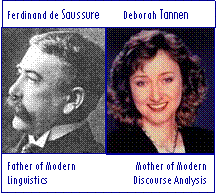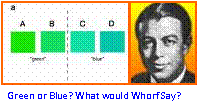The second one actually tests you over words, English to IPA and IPA to English; very cool and approved by ee! (:
Friday, October 24, 2008
Excellent IPA Tutorial, etc , compliments of Chris Duffel
The second one actually tests you over words, English to IPA and IPA to English; very cool and approved by ee! (:
All the IPA symbols in one sentence, modified to include previously missing symbols
Tuesday, October 21, 2008
Minimal Pairs
 A minimal pair proves that two phones (i.e., sounds) are completely separate phonemes in that language (and not two different variations of the same sound like our various pronunciations for /t/).
A minimal pair proves that two phones (i.e., sounds) are completely separate phonemes in that language (and not two different variations of the same sound like our various pronunciations for /t/).A minimal pair consists of two words in a given language with all the same sounds (in the same sequence) except for one, in the same place in the word.
For example, cap and gap are minimal pairs showing that /k/ and /g/ are separate phonemes in English. You can also have minimal triplets or minimal sets of sounds that are quite long. so add tap map, nap rap lap, sap, zap,map, chap, yap, (but not dap, wap, shap, zhap, bap, fap, vap, which are all lexical gaps just waiting to have a meaning assigned to them),
But not crap. Why not? It has more than 3 segments/phones in it, which is all the others in the set have.
On the other hand, crap and clap are a minimal pair, showing that /l/ and /r/ are separate phonemes in English (or allophones of separate phonemes, to be more accurate).
However, crap and crop are minimal pairs showing that /ae/ and /a/ are separate phonemes.
And crop and crock are minimal pairs showing that /p/ and /k/ are separate phonemes (in case you thought they were two variations of the same sound (: , which would just be sad ).
So the contrastive sound in a minimal pair can be initial, medial, or final in position, as long as both are in the same position in their respective words.
Stuff you can do with linguistics
Speech pathology: children, stroke victims, persons with other kinds of brain damage or language complication.
Accent reduction: Teach people to talk like everybody else
Writing fiction, etc: Represent dialects or language varieties accurately; use knowledge of language to bring about certain effects on the reader. Poe was very linguistically purposeful in the way he went about writing The Raven, Lanore. (:
Vocal performance: Be able to produce the sounds of songs in foreign languages you don’t actually know. Singing operas in Italian and so forth, which most of you do weekly, I'm sure
Actor: Be able to adopt the language variety of the character you are portraying. I.E. be Meryl Streep.
Government/politics: Be a diplomat (or a spy) (or both)
Military intelligence: Code breaking/Code making; communicating with the ‘enemy,’ combatants or otherwise. . .
Foreign language teaching: ESL or any other language. Speech and/or writing systems.
Other teaching: Teaching content areas to students in a language that is not native to them (e.g., teaching history in English to native speakers of Farsi).
Translation or Interpretation (written ((diachronic or synchronic)) or real time spoken) for the FBI, CIA , Corporate world or a zillion other spheres.
Computational linguistics: Teach computers to think like and communicate better with humans.
Create Machine translators for the FBI, CIA or Corporate world.
Cognitive linguistics: Use language to understand the cognition of the human brain.
Neurolinguistics: Identify parts of the brain that control various linguistic functions. . .
Psycholinguistics: Understand first and/or second language acquisition and bilingualism (different)
Understand something about human behavior and language
Experimental psychology: use language as a key to human psychology and processing.
Communications:
Marketing, Interfacing optimally with the public, understanding nonverbal communication; managing media production (including handing off the speaker turn to somebody at a remote location)
Teaching Reading to Children (or Adults): Be able to understand how dialect differences affect a person’s ability to connect orthography with the sounds of a language; understand the psychological processing of language for reading. . . .
Editing, Teaching Grammatical Styles: Syntax helps you understand and convey the ‘rules’ of a language, both prescriptive and descriptive.
Law: Be an expert witness as to where a person is most likely from, whether they are a native of x language, whether differences in their stories are likely to be due to fabrication or the normal processes of the human brain’s production of narrative from memory. . .
Medicine: Know whether the language anomalies in a patient’s speech are pathological and/or what pathology they are evidence of.
Language Planning & Policy: Help form public policy that regulates the use of language in a country or society (for various purposes). People who think “English Only” in the U.S. is a good idea are one example, people who want to argue for diversity of language and get legislation to protect this are another.
Choose or develop an orthography for your (nation’s) language. (E.g., Ataturk changed the Turkish writing system from Arabic script to the Roman script I am writing in right now).
Philosophy: Combine linguistics with logic and math to chase English and Anthropology majors away.
Academics: Teach, write scintillating articles, overwhelm people with your incomprehensibility to make them think you’re a genius, make not very much money.
Cultural Anthropology: Get into the ‘minds’ of your informants; discover unique linguistically encoded cultural features, assumptions in words and structures that do not exist in other languages.
Archeological Anthropology: Translate ancient texts; reconstruct ancient languages, etc.
Evolutionary/Biological Anthropology: Study animal communication systems and try to reconstruct the path of the evolution of language.
Sunday, September 7, 2008
Speaking of Parrots Speaking. . .
http://news.bbc.co.uk/2/hi/uk_news/7600955.stm
Monday, September 1, 2008
some ipa to whet your appetite
ju prabəbli wʊdnt wɝi əbaʊt wat pipəl Θɪnk Λv ju ɪf ju kʊd no haʊ sɛldəm ðe du.
ɔlən mɪlɚ.
Friday, August 29, 2008
Reviewing 8-28-08
Who is called the father of modern linguistics? What country was he from? How did he come to teach this course? What did he propound were the neglected elements of language that a scientific approach would have to attend to? What is metalanguage? What terms did Saussure introduce? What is the relationship of anthropology to linguistics? (This could be a trick question).
What do these terms mean?
metalanguage
semiotics
prescriptive vs. descriptive
diachronic vs. synchronic
langue vs. parole
paradigmatic vs. syntagmatic, which is illustrated by
Why do you have to teach a computer about the qualities of a room before it can 'understand' a story that involves a room?
What do linguistic, paralinguistic and extralinguistic mean?
How do linguists define GRAMMAR?? Why does ee insist that your grandma has perfect grammar in her native language?
What is the difference between 'good' English and 'standard' English, 'bad' English and 'nonstandard' English? Which should cause you to break out in hives?
How is semiotics related to intellectual curiosity as presented in class?
How did the French accidentally invent dialectology?
Why is American Sign Language more like spoken French than spoken English?
Why is narrative so important in the classroom according to mee?
How is the way you talk related to your identity?
Who is Wallace Chafe? What fruit is featured in the title of the important book comparing oral and written language within and between cultures? The ____ Stories. What animal will become the central artifact in the American Southern imagination in the 21st century? Wait, that wasn't my question. . . whose was it?
What is the irony of how the study of language progressed from written to spoken to gesture?
Bonus info: how not to make yourself America bait overseas, how to deflect the identity of an ugly monolingual American in Europe. . . how not to get chased by a band of angry protestors in Brussels, the truth about ugly babies, the virtues of naming your children after your siblings, the origin of madelina margarita, the significance of Sanskrit in East Asian languages, whether or not Chinese and Korean are related. . . who are Roger Shuy, Ralph Fasold and Walt Wolfram? What is the word for a line on a map that shows generally where one dialect ends and another begins regionally? What does learning two languages simultaneously as a baby do to your brain?
Wednesday, August 27, 2008
Motivation for Learning about Language
Regardless of your sincerity, the way you use language has an effect on your hearer, your relationship with your hearer, and yourself. If you want to achieve your interactional goals with someone (e.g., get them to like you, to lend you money, to leave you alone, to introduce you to someone you really want to meet, etc.) , you need to know how your language affects other people. What's going to make them feel respected, what's going to make them feel dissed, what's going to make them feel big, what's going to make them feel small, what's going to draw them to you and what's going to drive them away. So you can look at this from purely utilitarian terms, if you so desire. (Although some would question the juxtaposition of 'pure' and 'utilitarian' there). Studying the basics of language also helps you understand yourself and how your brain works, which should be of interest to everyone, right?
Saturday, August 9, 2008
Linguistics, Like Life and Rocks, Is Hard
You Must Prepare for this class. You must read and you must commit some stuff to memory. If you don't, it doesn't matter what the heck I do in class, you won't get a lot of it. There may be one person in 35 who doesn't have to do some actual reading to do well on the exams and even that person has to spend some time memorizing terms, formulas, etc. I spend an inordinate amount of time trying to make information accessible and enjoyable for you and I spend more time with students than anyone I know (who isn't also a student), so I am available for office hours. What I can't do for you is your memory work. If you come to me with nothing in your head yet about it, I can't help you understand how it works. And even though it may suggest that I'm a little messed up in the head, I feel like a failure when you don't learn. So learn dammit. (I'm not going to type damnit and you can't make me; deal with it.)
Every semester I take a little more time to prepare students for what the semester will bring because amazingly, every semester there is a ridiculously high number of students who just flat out don't believe me. Here's a testimonial from a student e-mail I got mid semester last spring:
I think I grossly underestimated the difficulty of this class but I've been doing the tutorials for the IPA on the blog and it's really starting to make sense. It feels like it's a little late for it all to start coming to me now but I think I am starting to understand it and like it more :) I just wanted to thank you for. . . yada yada
I think this student ended up withdrawing from the class. I think she's the only one who did, and my grade spreads come out well, but she's not the only one who found it to require actual preparation to their shock and amazement. Most people are going to do well if they just follow the daily recommended allowance of linguistic prep. If you spent 10 minutes a day on reviewing terms and stuff you have to memorize, you'd probably be in very good shape (that plus the reading and thinking ahead of time). ((I know, thinking is such an extraordinary thing for a prof to expect of you, they are So Unreasonable. . . don't they know you don't have time to think because you're too busy being a college student?)
So, truth in advertising, full disclosure. Be not deceived about what can co-occur with humor. And remember, you're building a brain here. And paying a lot of money to do it. I'll preach more about that later. (: But only because I love you. (:
Wednesday, August 6, 2008
I Urge You to Check Pick a Prof To Make Sure I Am the Right Prof for You
She may be funny, but linguistics is hard and her tests are serious.
This is because I believe that fun and excellence are not mutually exclusive.
(Radical I know)
Saturday, August 2, 2008
About Your Textbooks for 209
However, I feel morally bound to require a substantive textbook that has the seal of approval of linguists worldwide, so your required text is Language Files which is published by The Ohio State University Press. If I were you, I'd get on Amazon marketplace forthwith and order an earlier edition (the newest is the 10th) for a couple of bucks before everyone else in the nation gets on there to do the same thing and snatches them all up.
I also recommend the Introduction to Language text by Fromkin, Rodman, and Hyams. Any edition will probably meet your main needs. This book goes into more detail about every subject it covers and is very clear about everything. It also has nice summaries at the end of each chapter, a good glossary, and a lot of comic strips, which are pretty amusing. Some people complain that it is too wordy and otherwise redundant. This totally depends on what kind of reader and learner you are, so I'd look through the book rather critically before deciding to buy-- however, you can't really go wrong with a 2.00 copy of an earlier edition.
Wednesday, July 23, 2008
Is this the class you paid for?
This class is about how human language works--what makes us tick? Or Talk. (: Oh, I am hysterical. What is different about human language and animal communication systems or synthetic languages like the oh-so-successful Esperanto (which may or may not also come in polyester). How is it that any human with normal or even below normal intelligence can learn ANY language as long as they are adequately exposed to it as babies/young children? Do twins really have their own made up language? Do dolphins tell jokes? Did your language ability evolve from the other primates? Can chimps really 'speak' sign language? What is the universal capacity in the human brain to learn language?
Where do words come from? What is a real word Is 'duh' a real word? Is 'depth-y' a real word? I keep hearing people use it. How about doo-hickey? What is the rightful role of the dictionary in your life? Why would your linguistics prof contend that your grandma has perfect English 'grammah' (or whatever her native language is) even without meeting her? That's right, your grandmother, whoever she is, no matter how much education she has (or hasn't) is perfectly grammatical. . . even, hold on to your keyboard, if she regularly says, He don't and I ain't. It's true; why would I lie to you about something so important? (:
Why do some people learn second languages so easily and others pretty much not at all? Why is it hard to learn a new language as an adult? Why is English currently the world language? Is there something evolutionarily superior about it? (Hint: the answer is a big fat no, but why?)
Why can't your cat speak English? Several reasons, esp. if she's Siamese or Himalayan. . . Do girls talk more than boys? Do girls talk better than boys? What is verbal hygiene? What is a dirty word? What are the ethics of language use-what is offensive speech? Is it possible to talk in a way that doesn't offend anybody anywhere? Is offense the number one concern in determining what is 'right speaking'? What is 'bad English"? Do northerners speak 'better' than southerners? Is howdy good English? Why can't Japanese say their l's and r's 'right'? What cool tricks can you do if the roof of your mouth is incomplete? Does it affect your speech? Do parents teach their babies how to talk?
Is your interest piqued yet? Hopefully it's not peaked already because that would make for one dead class. And I refuse to teach dead people. Just a weird policy of mine. You might be able to find some profs who don't mind or even notice whether their students are dead or not. That's not me, so if that's what you've got your heart set on, you should probably re-register. Also, if you prefer for your prof not to know your name and face, if you want to be anonymous in a class, that's not my class either. I will know who you are and use your beautiful name frequently. Again, if that's not what you're looking for, you probably don't want to take this class with me. Learning is an activity, not a passivity. (yeah that's a word, i'm a linguist and if i want it to be a word it's a word dang it!).
Now I actually have some work to do, but I just wanted to get you set on the right course, as it were. (:
Peace out,
ee
Saturday, April 5, 2008
How do you say that word? Name? City?
http://www.forvo.com/tag/famous_people/
Friday, April 4, 2008
Morphology power point slides
One fancy Turkish word and agglutination
Thursday, April 3, 2008
So, a Japanese snake talks in syllables. . . (onomatopoeia)
http://www.npr.org/templates/story/story.php?storyId=4699514
http://www.flat33.com/bzzzpeek/index1.html#
Tuesday, April 1, 2008
ipa practice from a few weeks ago, us being weird in class (ok, me being weird)
compliments of kiana
wʌns ǝpan ǝ taɪm ðɛr wʌz ǝ klæs fʊl ʌv brɪljǝnt ægiz hu wɚ ɪn lʌv wɪθ ði aɪ pɪ e, wɪʧ sɝvd ðɛm wɛl bikaz ðɛr wʌz lats ʌv aɪ pɪ e trænskrɪpʃǝn an ðɛr mɪdtɝm ɛgzæm.
wat ɪz ǝ fon? ɪnibadi? ɪnibadi??! raɪt! ɪts ǝ ra ʌnkætǝgɔraɪzd saʊnd-æn ǝkustǝk riælǝti--ɪt kænt bi riprǝdust baɪ ǝ hjumǝn -- waɪ?! (ɔr aɪ?!) so ǝ fon ɪz laɪk æn ivent (ivɪnt).
ʃi hæd ǝ begǝl ɝliɚ - wi stɪl donʔ no wat kɛli ɪz itɪŋ. pɝsǝnǝli, aɪ hæd maɪ juʒuǝl hatkeks ænd sasǝʤ wɪɵ ǝ larʤ daɪǝʔ kok frʌm mɪkdanǝldz (mǝkdanǝldz) ɪn maɪ kar ɪn ðe parkɪŋ lat æt sent mɛriz, waɪl wetɪŋ an ðǝ dud hu teks maɪ mʌni tu gɛt ðɛr ænd gɪv mi ǝ pæs.
Oke, ǝ fonim, æʃli, ɪz dɪfrǝnt frʌm ǝ fon haʊ? æʃli ar ju ðɛr? æʃli?!! ǝpɛrǝnʔli æʃli hæz slɪpt ɪntu a komǝ raɪt bihaɪnd maɪ vɛri aɪz. ɪz ʃi dɛd?!? kwɪk, sʌmbʌdi ʧɛk hɝ pʊls! kwɪk laɪk ǝ bʌni! aɪ donʔ hir ɪni æktɪvǝti—ju ar e hartlɛs kruǝl grup ʌf pipǝl. Raksi, ɪz ʃi ǝlaɪv? ʤuljiǝ? ɪz æʃli ǝlaɪv?
Saturday, March 29, 2008
more ee cummings for IPA practice
wʌt ɪf ə mʌtʃ əv ə wɪtʃ ʌv ə wɪnd
gɪvz ðə truθ tu sʌmɚz laɪ;
blʌdiz wɪθ dɪzijɪŋ livz ðə sʌn
ænd jeŋks ɪmɔrtəl starz əraɪ?
blo kɪŋ tə bƐgɚ ænd kwin tə sim
(blo frɪnd tə find: blo spes tə taɪm) –
wɪn skaɪz ar heŋd ænd oʃənz draʊnd,
ðə sɪŋgəl sikrət wɪl stɪl bi mæn
wʌt ɪf ə kin əv ə lin wɪnd flez
skrimɪŋ hɪlz wɪθ slit ænd sno:
streŋgəlz væliz baɪ rops əv Ɵɪŋz
ænd staɪfəlz fɔrəsts ɪn waɪt əgo?
blo hop tə tƐrɚ; blo sijɪŋ tə blaɪnd
(blo pɪti tə ɪnvi ænd sɔl tə maɪnd) –
huz harts ar maʊntənz, ruts ar triz,
ɪts ðe ʃæl kraɪ həlo tə ðə sprɪŋ
wʌt ɪf ə dawn əv ə dum əv ə drim
baɪts ðɪs junəvɝs ɪn tu,
pilz fɚɛvɚ aʊt əv hɪz grev ænd
sprɪŋkəlz nowƐr wɪθ mi and ju?
blo sun tu nɛvɚ and nɛvɚ tu twaɪs
(blo laɪf tu ɪzɪnt: blo dɛθ tu wʌz.)
alz nʌƟɪŋz ɔnli aʊɚ hjuʤəst hom;
ðə most hu daɪ, ðə mɔr wi lɪv.
Saturday, March 22, 2008
Thursday, March 20, 2008
Some Study Questions for QuiXam 3
What is a phone? Give three defining adjectives that ee has provided in class notes and the chaplets:
What is a phoneme?
What is an allophone?
What is phonology?
What is complementary distribution?
What is overlapping distribution?
What is a natural class?
Name all the natural classes you know.
You should know at least 18 for consonants and at least 7 for vowels (look at your IPA charts for clues)
Give an example of a word initial minimal pair, word medial minimal pair, word final minimal pair
What does a minimal pair prove?
Is it an allophone of any phoneme in that language?
Allophones of separate phonemes- what kind of distribution is this?
Mark Superman –allophone (least common, occurs in the most restricted environments)
Clark
Mark Superman and
Phonology Problems:
You are given two phones that belong to the same language,
You’re trying to figure out if they belong to the same phoneme or
to different phonemes.If they belong to the same phoneme, they exist in
complementary distribution (like the 4 T’s) If they belong to separate
phonemes, they exist in overlapping distribution, they are distinctive.
If they are distinctive, you can make a minimal pair by substituting one
for the other in the same place in the word, and come up with two
totally different words--Meaning they make two different words in
minimal pairs.
What’s the importance of convention in relationship to the arbitrary
design feature of language?
meaning of a word or phrase?
What are four sources/directions/triggers of variation in the meaning of a given word or phrase? 1) Across Time, 2) Across Regions 3) Communities 4) Across Languages/Cultures (e.g.,
Sunday, March 2, 2008
Excellent IPA Tutorial, etc , compliments of Chris Duffel
http://staff.washington.edu
Tuesday, February 26, 2008
Ebonics and AAVE
Midterm Exam
Monday, February 18, 2008
Follow up on AAVE
That's all for now. (:
Thursday, February 14, 2008
The Rich List Part 1

You can always be assured that I won't give you transcriptions that make you choose between dialects for the pronunciation of a particular word. (Not just because I love you, but because I love ME!) (: The questions test your knowledge of what sounds each symbol represents. If there ever is a doubt about whether you really do pronounce a word the way you maintain, all you have to do is pronounce it for me and if you really do produce the sounds you claim, then of course you will get those points.
You can get extra credit by bringing in a video clip of someone pronouncing a word in a particularly marked way, one that differs from the SAE (Standard American Englis) pronunciation.
human biological adaptations mnemonic
so: because linguists love language they talk. -Elizabeth Wells-
Lisa taught Tim Linguistics by lunch. -Brian Smith-
Two Little Toys Live Like Boys
Teeth Lips Tongue Larynx Lungs Brain -Amelia Butler-
Black Lizards Like To Talk Loosely. -Amanda Netherly-
"you're Too Little To Laugh Little Boy!" -Whitney Swanson et al-
Little (lips) Toto (tongue) Loves (larynx) Lions (lungs), Tigers (teeth), & Bears (brain)! Valerie Brak
mnemonic for places of articulation-consonant ipa chart
Ben Ladin is a pretty vicious guy.
Bilabial- Labiodental-Interdental-Alveolar-Palatal-Velar-Glottal -Ashley Cooper-
















